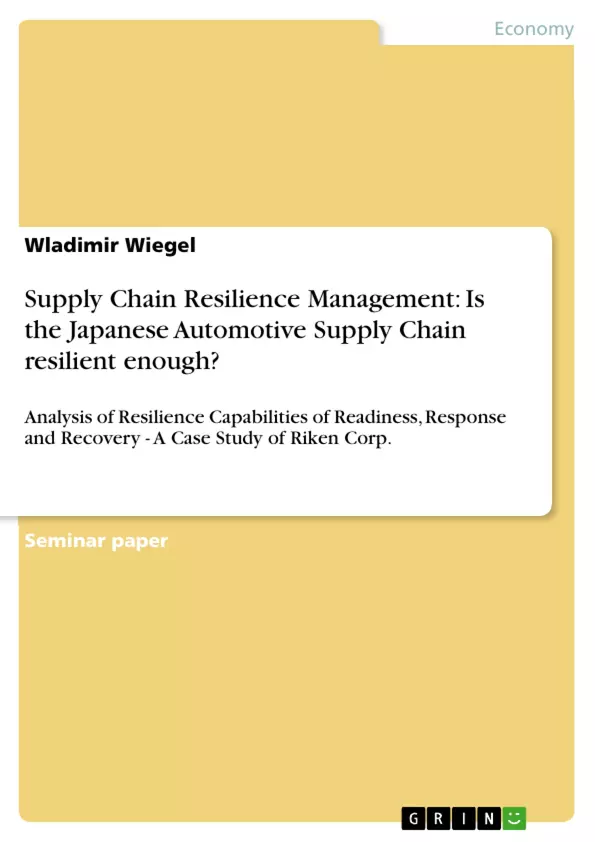Since 1980’s the Japanese car manufacturing industry has been celebrated as the most efficient car industry in the world regarding production systems and processes. However, on 16 July 2007 this efficiency of the entire Japanese automotive industry was challenged when an earthquake hit the Chuetsu region in Japan and decimated a small but critical portion of its supply chain. Riken Corp., a supplier of automobile engine components such as piston rings, was this critical sup-ply chain bit. Its failure to operate after the event caused a chain reaction of plant closures of the main eight Japanese car manufacturers and parallelised nearly 70 per cent of the world biggest auto production industry. The underlying qualitative study adopts some conceptual supply chain resilience management models available in the academic literature as theoretical lenses to analyze the Riken Corp. case. The main argument of this research paper is that while the Japanese automotive supply chain is capable of delivering an efficient and effective response to and recovery from an interruption, it, however, lacks the capability of event readiness, which is the active resilience preparation for a supply chain disruption.
Inhaltsverzeichnis (Table of Contents)
- 1. INTRODUCTION.
- 2. OVERVIEW OF THE JAPANESE AUTO MANUFACTURING INDUSTRY.
- 3. JAPANESE AUTOMOTIVE SUPPLY CHAIN AND THEORETICAL RESILIENCE FRAMEWORK.
- 3.1 GENERIC JAPANESE CAR MANUFACTURING SUPPLY CHAIN.
- 3.2 THE IMPACT OF SUPPLY CHAIN DISRUPTIONS ON JAPANESE AUTOMOTIVE INDUSTRY.
- 3.3 THEORETICAL RESILIENCE MODEL.
- 4. TESTING THE RESILIENCE MODEL AND IDENTIFYING POTENTIAL COMPETITIVE ADVANTAGE.
- I. Was the Japanese automotive industry ready enough for the earthquake event?
- II. How does the Japanese automotive supply chain response to disruption events?
- III. Is the Japanese automotive supply chain capable of recovering from its losses?
- IV. What competitive advantage can the Japanese automotive industry gain from a more resilient supply chain?
- 5. CONCLUSION.
Zielsetzung und Themenschwerpunkte (Objectives and Key Themes)
This working paper examines the resilience of the Japanese automotive supply chain by focusing on the specific case of Riken Corp. The study aims to analyze the resilience capabilities of the Japanese automotive supply chain in terms of readiness, response, and recovery in the face of disruptive events, specifically the 2011 Tohoku earthquake. The analysis uses a theoretical resilience model to assess the industry’s preparedness, response mechanisms, and recovery capabilities.
- Supply Chain Resilience in the Automotive Industry
- The Impact of Disruptive Events on Supply Chains
- Theoretical Framework for Assessing Supply Chain Resilience
- Case Study of Riken Corp. and the Japanese Automotive Supply Chain
- Competitive Advantage through Resilient Supply Chains
Zusammenfassung der Kapitel (Chapter Summaries)
- Chapter 1 introduces the topic of supply chain resilience management and its relevance to the Japanese automotive industry.
- Chapter 2 provides an overview of the Japanese automotive manufacturing industry, highlighting its significance and the challenges it faces.
- Chapter 3 delves into the Japanese automotive supply chain, outlining its structure and the impact of supply chain disruptions on the industry. It also introduces a theoretical resilience model for assessing the industry’s preparedness, response, and recovery capabilities.
- Chapter 4 applies the theoretical resilience model to the Japanese automotive industry, specifically examining the industry's readiness, response, and recovery capabilities in relation to the 2011 Tohoku earthquake. It also explores potential competitive advantages that can be gained from a more resilient supply chain.
Schlüsselwörter (Keywords)
The key terms and concepts explored in this paper include supply chain resilience, automotive industry, Japanese automotive supply chain, disruptive events, resilience model, readiness, response, recovery, competitive advantage, and the 2011 Tohoku earthquake.
Frequently Asked Questions
What is supply chain resilience?
It refers to a supply chain's capability for readiness, response, and recovery when facing disruptions.
Why did the 2007 earthquake impact the entire Japanese auto industry?
The failure of Riken Corp., a critical supplier of piston rings, caused a chain reaction of plant closures across all eight major manufacturers.
What is the main weakness of the Japanese automotive supply chain?
According to the study, it lacks "event readiness," which is the active preparation for potential disruptions before they occur.
How did the industry respond to the 2011 Tohoku earthquake?
The paper analyzes the industry's response and recovery mechanisms using a theoretical resilience framework.
Can a resilient supply chain provide a competitive advantage?
Yes, the study explores how higher resilience can lead to faster recovery and better market stability compared to competitors.
- Quote paper
- Wladimir Wiegel (Author), 2010, Supply Chain Resilience Management: Is the Japanese Automotive Supply Chain resilient enough?, Munich, GRIN Verlag, https://www.grin.com/document/167383



